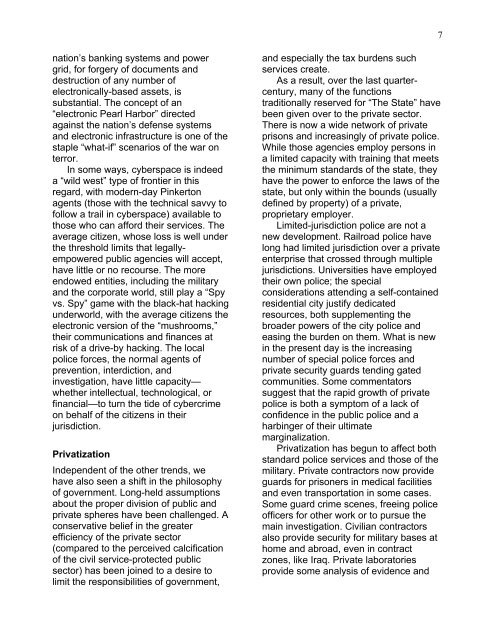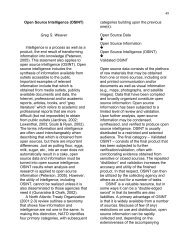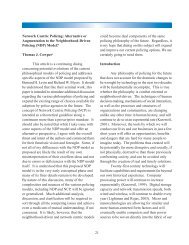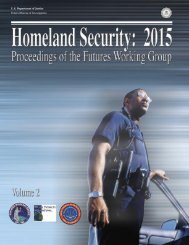Volume 4 FWG - Futures Working Group
Volume 4 FWG - Futures Working Group
Volume 4 FWG - Futures Working Group
You also want an ePaper? Increase the reach of your titles
YUMPU automatically turns print PDFs into web optimized ePapers that Google loves.
7nation’s banking systems and powergrid, for forgery of documents anddestruction of any number ofelectronically-based assets, issubstantial. The concept of an“electronic Pearl Harbor” directedagainst the nation’s defense systemsand electronic infrastructure is one of thestaple “what-if” scenarios of the war onterror.In some ways, cyberspace is indeeda “wild west” type of frontier in thisregard, with modern-day Pinkertonagents (those with the technical savvy tofollow a trail in cyberspace) available tothose who can afford their services. Theaverage citizen, whose loss is well underthe threshold limits that legallyempoweredpublic agencies will accept,have little or no recourse. The moreendowed entities, including the militaryand the corporate world, still play a “Spyvs. Spy” game with the black-hat hackingunderworld, with the average citizens theelectronic version of the “mushrooms,”their communications and finances atrisk of a drive-by hacking. The localpolice forces, the normal agents ofprevention, interdiction, andinvestigation, have little capacity—whether intellectual, technological, orfinancial—to turn the tide of cybercrimeon behalf of the citizens in theirjurisdiction.PrivatizationIndependent of the other trends, wehave also seen a shift in the philosophyof government. Long-held assumptionsabout the proper division of public andprivate spheres have been challenged. Aconservative belief in the greaterefficiency of the private sector(compared to the perceived calcificationof the civil service-protected publicsector) has been joined to a desire tolimit the responsibilities of government,and especially the tax burdens suchservices create.As a result, over the last quartercentury,many of the functionstraditionally reserved for “The State” havebeen given over to the private sector.There is now a wide network of privateprisons and increasingly of private police.While those agencies employ persons ina limited capacity with training that meetsthe minimum standards of the state, theyhave the power to enforce the laws of thestate, but only within the bounds (usuallydefined by property) of a private,proprietary employer.Limited-jurisdiction police are not anew development. Railroad police havelong had limited jurisdiction over a privateenterprise that crossed through multiplejurisdictions. Universities have employedtheir own police; the specialconsiderations attending a self-containedresidential city justify dedicatedresources, both supplementing thebroader powers of the city police andeasing the burden on them. What is newin the present day is the increasingnumber of special police forces andprivate security guards tending gatedcommunities. Some commentatorssuggest that the rapid growth of privatepolice is both a symptom of a lack ofconfidence in the public police and aharbinger of their ultimatemarginalization.Privatization has begun to affect bothstandard police services and those of themilitary. Private contractors now provideguards for prisoners in medical facilitiesand even transportation in some cases.Some guard crime scenes, freeing policeofficers for other work or to pursue themain investigation. Civilian contractorsalso provide security for military bases athome and abroad, even in contractzones, like Iraq. Private laboratoriesprovide some analysis of evidence and






